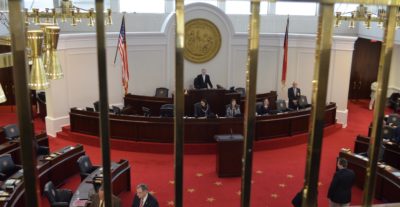
Share this story
|
|
It’s been a busy week at the General Assembly. On Tuesday alone, the House filed 163 bills – many of them education related.
Several of those bills involve the expansion of school choice. As EdNC previously reported, many of the bills could pose a threat to overall funding for public schools, but even more importantly to enrollment.
HB793, “Public School Open Enrollment,” is an act “to allow students to attend any school within the local school administrative unit in which the student is domiciled.” This bill would require local boards of education to adopt “open enrollment plans” for students, regardless of where they are zoned to go to school.
HB800, “Public School Part-Time Enrollment,” would require local school administrative units and charter schools to allow the part‑time enrollment of students who otherwise attend nonpublic school.
On March 29, a bill that would radically expand the opportunity scholarship program was filed in the Senate. Mebane Rash has a write up of that here.
This month, several bills were filed concerning that program. SB665 would allow homeschooled students to receive the vouchers, and HB667 lays out testing requirements for the program.
HB823, “Choose Your School, Choose Your Future,” was filed by Rep. Tricia Cotham on Tuesday. That bill would eliminate income eligibility requirements for the program, among other things, and require a specific sequence of courses for early high school graduation.
Cotham, a former educator and assistant principal who was elected as a Democrat in Mecklenburg, announced her switch to the Republican party earlier this month. She also filed HB824, “Teacher License Reciprocity from Every State,” and HB825, to expand the teaching fellows program.
The House also filed several bills regarding history.
On Tuesday, HB464 was amended to include one school district’s history lessons. A committee substitute, according to the N.C. Tribune, “added a provision authorizing the Beaufort County school system to ‘use the Hillsdale College K-12 Curriculum’ in lieu of the state’s standard course of study, without review or approval by the State Board of Education.”
Hillsdale College, according to the Tribune, is private with a “decidedly conservative bent.” The Tribune is reporting that “the chairman of the Beaufort school board, T.W. Allen, said Friday his board has made no such request.”
By Wednesday, that amendment was removed before the bill was sent to the Senate. Rep. Keith Kidwell, R-Beaufort, said during Wednesday’s House session that authorization for the curriculum at Beaufort County Schools and other districts would be revisited later.
Meanwhile, the House filed HB756, which would give the General Assembly power to recommend public K-12 standards. Currently, those are set by the Department of Public Instruction (DPI).
Rep. Jon Hardister, R-Guilford, also filed HB686, which would provide “comprehensive civil rights education to every student in the state,” from elementary through high school.
Other bills of note include HB729, which would add a “segregation score” to school report cards, and several bills related to free school meals (SB708: School Meals for Every Child, HB776: Free Lunch for Some Students/Stop Lunch Shame, and HB777: Universal No-Cost School Meals). Additionally, HB653 would provide plant-based lunch options for students.
The House K-12 Education Committee met Tuesday and heard a presentation on student pandemic learning recovery. DPI’s Dr. Jeni Corn told lawmakers “North Carolina is on track – we are in the phase of recovery.” You can read more about the presentation here.
On Wednesday, the Senate Higher Education Committee met to discuss a bill that would overhaul governance within the N.C. Community College System.
Among other things, Senate Bill 692 would give the system president and Republican-led General Assembly more power. In turn, the bill would reduce the authority of the State Board of Community Colleges and take power away from the governor and local leaders.
The rules committee gave a favorable report to SB692 on Thursday morning. Now the bill must go before the Senate.
Student conduct
On Wednesday, the House passed a bill that would remove a list of student conduct that “would not be deemed to be a serious violation” from state statute. That language was there in an effort to minimize the time students spend out of school due to long-term suspension or expulsion by limiting those penalties to “serious violations.”
The items currently designated in law as not being serious violations are inappropriate or disrespectful language, not following a “staff directive,” violating dress code, and minor fights that don’t involve weapons or injuries. Under statute, principals have the ability to elevate one of these minor violations to a serious one if they deem it appropriate.
Supporters of the bill, HB188, say it will improve school discipline, while critics worry it could lead to an increase in students missing school. The bill passed 71-42, with three Democrats voting in favor, and Rep. Jeffrey Elmore, R-Wilkes, a teacher in Wilkes County, voting against it.
The House passed a similar bill in 2021 that was not acted on by the Senate.
“We know that Black students … are continually punished in bigger numbers for disrespectful language. We know … that girls are punished more for dress code violations than boys are,” Rep. Julie von Haefen, D-Wake, previously said about the bill. “There’s the reason that examples were put into this bill because they’re guiding principles that have guided our local school districts to make sure that they’re not punishing kids disproportionately for these specific things.”
Transgender students and sports
On Thursday, the Senate also passed Senate Bill 631, “Fairness in Women’s Sports Act.” The bill would require transgender athletes at the middle, high school, and college level to play on teams assigned by their “reproductive biology and genetics at birth.” The bill now heads to the House, where the companion bill was already passed on Wednesday. Three Democrats joined Republicans in the 73-39 House vote.
Republicans say the bill “is a commonsense solution to the unfair advantage gained when biological males compete in female sports,” per a state Republican press release.
“The Fairness in Women’s Sports Act is pro-woman legislation,” primary bill sponsor Sen. Kevin Corbin, R-Macon, said in the release. “We cannot ignore the physical differences between men and women in sports. By keeping sports designated to biological sex we are allowing female athletes to compete on an even playing field.”
Opponents of the bill say it is an attack on LGBTQ+ rights that is part of the larger “culture war.” No more than 15 transgender athletes have been approved to play high school sports this year in North Carolina, the Associated Press reported, and only two are transgender girls.
The following bills were also passed in one of the chambers this week.
- HB38: Entry Fees for HS Interscholastic Events. This bill would require high schools to accept cash for admission at the time of “interscholastic athletic events.”
- HB314: Conflicts of Interest Training/LEAs. This bill would require conflicts of interest training for certain public school employees.
- SB384: Carbon Monoxide Detectors/School Bldgs. This act, if passed, would study “the installation of adequate carbon monoxide alarm and detection systems and the implementation of radon gas testing in all identified public schools.”
- SB411: Students in Home School Take PSAT/AP. If passed, this bill would allow homeschooled students to take Advanced Placement (AP) exams, along with the Preliminary Scholastic Assessment Test (PSAT).
The list below includes other education bills filed this month, in both the House and Senate.
Bills filed in the House
- HB605: School Threat Assessment teams.
- HB618: Charter School Review Board.
- HB640: Career Path Options Transparency Act.
- HB621: 3-Year FDA Approval for New Childhood Vaxx.
- HB833: Increase Minority Male Teachers/Program Study.
- HB671: Restore State Emp/Teacher Retiree Med Benefit.
- HB762: School Social Workers/Master’s Pay.
- HB675: Healthy and High Performing Schools.
- HB705: Build Safer Communities and Schools Act.
- H758: Youth CERT Preparedness K-12 Training.
- HB716: Career Courses for Middle Schoolers
- HB730: Funds for the Expansion of NC Pre-K
- HB763: Limit School Counselor Ratios.
- HB764: Montessori License.
- H765: Public School Medical Assistants.
- HB766: DPI to control NC Pre-K literacy curriculum.
- HB767: Expanding Workforce and Education Act.
- H773: Let Parents Choose/Sammy’s Law of 2023.
- HB780: State ID’s for HS students.
- H803: County Service Districts/Early Childhood Ed.
- HB631: University Research Status Enhancement Fund.
- HB601: Community Colleges Funding and Accountability study.
- HB602: K-3 Class size waiver.
- HB619: Learning AAPI Contributions in Schools.
- HB585: School Psychologist Omnibus
Bills filed in the Senate
- SB688: Child Care Act
- SB694: Funds for Ready for School, Ready for Life.
- SB698: Expand Academic Trans. Pathways/Sophomore HS.
- SB706: In-State Tuition Equity
- SB722: Child Care Flexibilities
- SB734: Constitution Quote at School Entrances
- SB740: Fully Fund School Psychologists and counselors
- SB742: Revise Rules/NC Pre-K Licensure Credentials.
- SB598: Healthy Students – A Nurse in Every School.
- SB618: TA’s to Teachers
- SB634: Cap Charter Schools
- SB566: School Mental Health Support Act
- SB483: $17/Hour Min. Pay for Noncert. Sch. Employees.
- SB485: Study Cell Phone Use in School
- SB522: Informational Literacy Bill
- SB523: Increase School Psychologists
- SB528: Replace Public School HVAC.
You can read more about bills introduced before April here.




